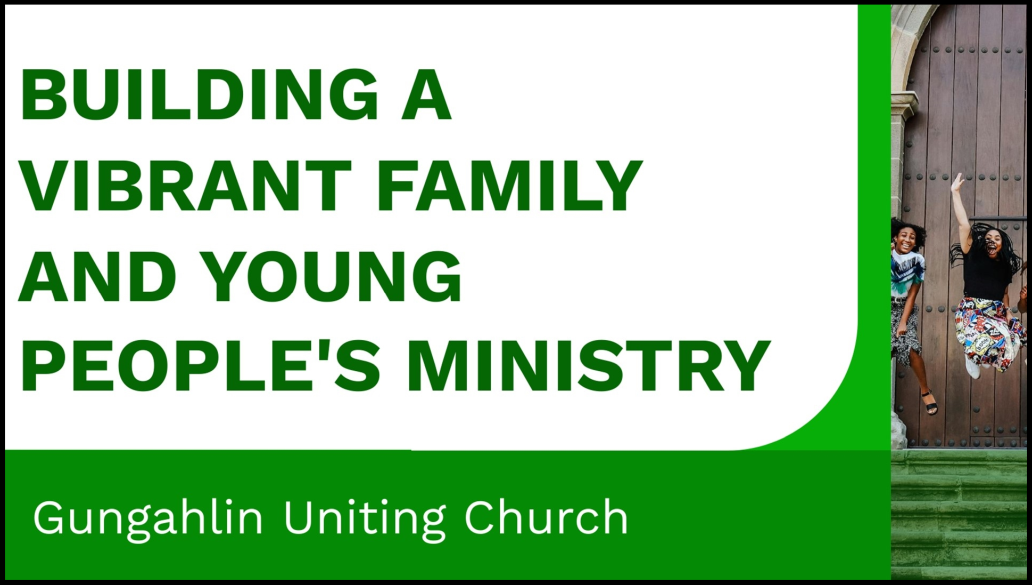
Introduction
This plan has been developed by the Church Council of Gungahlin Uniting Church (GUC). It provides a way forward to growing a sustainable, vibrant family and young people’s1 ministry which gives young people and their families meaningful opportunities to grow in faith and to develop positive connections and relationships. It builds on existing programs which currently reach out to both those at GUC and in the community.
The plan is consistent with child safe policies which emphasise the importance of protecting and nurturing children within our church community, and which calls us to create an environment where every child feels valued, safe, and empowered to flourish spiritually, emotionally, and physically.
Focusing on young people and their families will also help GUC grow. We have enormous potential in Gungahlin, where the median age is only 32, where there are almost 24,000 families and where 23% of the population is under the age of 152.
This plan does not seek to prioritise young people and families at the expense of other members of the congregation. It does, however, recognize that we need to do more to support young people to develop and mature in their relationship with God, to provide them and families with greater opportunities for connection, and for GUC to grow as a multi-generational congregation.
Links to GUC and Presbytery’s Mission plan
This plan gives life to GUC’s mission plan in relation to children’s ministry: GUC hopes to expand our children’s programs, both within the church and as an outreach. This will mean we will need to grow the number of young families attending worship and to develop worship and study that meaningfully connects with them and their children and helps them explore their faith as individuals and as families3.
As we seek to be more accommodating with families and young people through this plan, we will also be living out a commitment of our Presbytery’s Mission Plan: Helping each other grow connections with our local communities – Expressing what we do in different ways to cross into new territory in connecting with people in our local communities, as spaces to express and share our faith, and to discern and create new communities of faith that fit the local context.
And as we seek to link up our families and young people ministry with other similarly focused ministries in our Presbytery and Synod, we will also be living out the commitment in the Mission Plan about Being church together – Building deeper connections across the Presbytery and wider Uniting Church. Becoming more cohesive, while valuing our diversity, and growing from each other’s experiences.
What do we need to do
We have identified six strategies important to building a vital family and young people’s ministry, some of which we are already doing well, and some where we could do better. These strategies will continue to be underpinned by strong governance of safe church principles and policies.
Engage, develop and support leaders

It is important to ensure volunteers are adequately supported and resourced and are trained/mentored. Increased volunteer support is also critical. We will encourage greater engagement of parents/others through flexible, bite-size volunteering opportunities, building their confidence to take on greater roles over time.
Offer engaging activities and programs which build faith and connection
We propose to offer a range of programs and activities for young people of different ages and interests which are engaging, help young people grow in their faith, and develop positive relationships and connections.

Foster a culture of inclusion

It is important to encourage the participation of young people in all aspects of church life. We will provide opportunities for them to contribute their ideas, talents, and perspectives, and ensure they feel valued and respected as integral members of the congregation. We can create young leaders by providing them with leadership opportunities.
Create energy by ensuring young people’s programs have high visibility within the congregation
We propose to heighten awareness of young people’s programs by promoting and creating a buzz around what is being done. We will celebrate the accomplishments and milestones of young people, whether it’s participating in a church camp, achieving a personal goal (e.g. Brigade award), finishing year 12 or starting school.

Connecting with families

If we provide opportunities for families to connect with one another and build a strong support network within the church community, we are more likely to cultivate a sense of belonging and camaraderie that encourages them to actively engage. We propose to extend opportunities to the wider Gungahlin community.
Listen to young people
We must be prepared to listen and learn from young people and to encourage cross-generational discussion and understanding. We will regularly solicit feedback from young people, parents, and volunteers to gauge the effectiveness of existing programs. We will actively listen to the concerns and suggestions of young people and families and be responsive.

How we will do it
These six strategies will be implemented over three stages. Each stage, and the success factors, builds on previous stages. Whether GUC embraces all three stages depends on the level of congregational support – we can choose to stop at any stage. We can also bring forward parts of each stage or otherwise change direction if an opportunity presents and there is sufficient support.

This stage focuses on building on our current programs – Playgroup, Oasis, Billabong and Girls and Boys Brigade – and seeks to generate greater congregational engagement and support for young people’s ministry. During this stage the Pulse team (the Synod children and youth ministry team) will be invited to discuss the “Growing Young” program to engage interest and support more detailed planning. This will involve the Pulse team meeting with interested GUC members monthly over a six month period.
This stage:
- ensures current programs have age-appropriate and engaging material which support young people’s faith development
- extends programs to include social and other activities which build connection, faith and positive relationships:
- Encourage each young people’s group to go on a Synod/Brigade-sponsored camp each year.
- Offer social activities, including joint activities between GUC groups (eg joint Brigade and Oasis/Billabong activities) and/or across Presbytery to build connections.
- increases visibility of programs within GUC and build a sense of energy and vitality:
- Actively promote programs in bulletin/announcements, provide feedback on what young people are doing, celebrate special events (eg camp) etc
- encourages greater participation of parents/ other congregational members in leadership and at group activities and camps
- Provide flexible, “bite-size” opportunities to volunteer that recognises availability and commitments.
- Recognise and celebrate the contribution of volunteers.
- promotes inclusiveness:
- Look for opportunities to include young people in all aspects of church life – extend to Brigades and Oasis and to a wider range of areas.
- Regular young people’s services (which could include the Brigades) to promote programs and build inclusiveness: tell the story of what has been done over the term, display work and talents, encourage leadership and involvement.
- New people are welcomed by other young people.
This stage envisages a small team interested/involved in young people’s ministry to support planning and coordination and to obtain feedback. Our Minister would work particularly with Oasis and Billabong to support leaders and to ensure they have appropriate resources, including programs. A broader, more strategic group would work with the Pulse team in considering “Growing Young”.
We will know we are successful if:
- parents and young people report that:
- programs are engaging and provide opportunities to grow in faith
- young people feel valued and have a sense of connection with GUC
- relationships are forming within and between groups at GUC and across Presbytery
- more people are actively engaged in supporting/leading young people’s ministry. Young people’s programs are well supported with adult leadership.

This stage builds on the momentum created during stage one and is dependant on increased engagement of the congregation during stage one. There is a greater focus on growth. New families are attracted to and integrated into the life of GUC by offering a diverse range of family-friendly activities and services.
GUC would initially seek to fund the position through a grant from Synod (Synod Growth Investment Fund), but eventually through growth in GUC membership. If successful, the person will work alongside the Minister and volunteers to build support, coordinate events, encourage involvement and mentor volunteers. They will not replace volunteers – they will only be successful if there is strong ongoing congregational support.
Stage two extends GUC’s programs to include:
- regular family friendly events
- alternative forms of family friendly worship (eg messy church, café church)
- programs to cover current gaps such as college, young adults, preschoolers; consider alternative young people’s programs.
We will know we have been successful if, in addition to earlier success factors:
- programs are well resourced with volunteer leaders/helpers. Families and others are actively engaged in supporting activities
- leaders report that they are well supported and are confident in their roles
- GUC’s family and young people’s programs are embraced by the congregation as an important ministry of GUC
- there is growth in the number of
- new families attending GUC
- families and young people participating in programs/activities.

This builds on earlier stages and takes our mission to the wider community. We will continue to employ a person to facilitate and coordinate these mission activities.
GUC already ministers to young people and families in the community ministry through Playgroup, Girls and Boys Brigade, as well as the food pantry, café and food garden. In this third stage we look for other opportunities to connect with families within Gungahlin. This could include working alongside community partners (for example Uniting Care or the proposed Gungahlin Community Centre), rather than replicating existing programs.
We will know we have been successful if, in addition to earlier success factors:
- we receive positive feedback from community members that activities fill a community need and are well run
- GUC is known within the Gungahlin community for its family and young people’s programs
- growth in numbers attending GUC means our family and young people’s programs are financially sustainable.
Conclusion
The Church Council of Gungahlin Uniting Church propose this plan after prayerful reflection and with consultation with others in the Synod and Presbytery. It is flexible, and so able to respond to changing need within GUC and Gungahlin more widely, while also providing a path for GUC as a congregation and community to walk down together as we seek to uplift our families and young people.
Gungahlin Uniting Church Council
11 June 2024
1 References in this plan to young people includes children, youth and young adults
2 2021 ABS Census- Gungahlin https://www.abs.gov.au/census/find-census-data/quickstats/2021/80104
3 Growth Opportunity Plan for Gungahlin Uniting Church December 2022